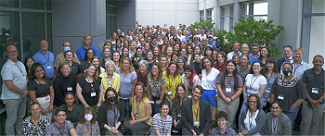Superfund Research Program
July 2022

Per- and polyfluoroalkyl substances (PFAS) were front and center during the 3rd National PFAS Meeting in Wilmington, North Carolina.
SRP grantees and their collaborators, other scientists, community members, and policymakers came together to share research and personal stories about the chemicals.
Funded in part by SRP, the conference was coordinated by researchers at the North Carolina State University (NCSU), University of Rhode Island (URI), and Northeastern University SRP centers, and and community partners.
"We are unaware of another conference series that offers such a unique opportunity for collaboration among communities, researchers, policymakers, and health advocates," said NCSU SRP Center Director Carolyn Mattingly, Ph.D., who chaired a session on the long-term health effects of PFAS exposure.
The session also featured Jamie DeWitt, Ph.D., of the NCSU SRP Center, and Philippe Grandjean, Ph.D., of the URI SRP Center, who spoke about their research using animal and human population studies to understand the link between exposure to PFAS and effects on the immune system.
Another session, chaired by URI SRP Center Director Rainer Lohmann, Ph.D., focused on progress and challenges in cleaning up sites contaminated with PFAS. The session included a presentation y Detlef Knappe, Ph.D., of the NCSU SRP Center, who spoke aout his work to uncover how granular activated carbon can absorb PFAS and support remediation efforts.
Community response, policy changes, medical monitoring, children's health, and dietary exposure were among other topics covered.
Duke University SRP Center Director Heather Stapleton, Ph.D., NCSU SRP Center investigators Jamie DeWitt, Ph.D., and Jane Hoppin, Ph.D., and URI SRP Center researcher Laurel Schaider, Ph.D., also spoke at the meeting.
"It was extremely impactful to hear the stories of affected communities," said SRP Health Specialist Brittany Trottier, M.P.H., who attended the conference. "It highlighted that the work we support at SRP is imperative to continue. We don't have all the answers yet and there is still a lot more to do."
Read more in the NIEHS Environmental Factor Newsletter.


